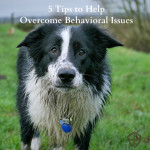Socialization May be Key to a Longer Lived, Healthier Dog
Socialization May be Key to a Longer Lived, Healthier Dog: Insights into Canine Well-being
We ran across an article in ScienceAlert about a study which found socialization to be a vital component of a dog's healthy aging. In fact, they said it could be five times more important than other aspects!
That got us wondering about the topic of socialization in general, so we did some digging into it. What we found applies to all dogs. There were no herding-breed-specific studies we found on the topic. But, that being said, it all applies perfectly well to our beloved herding breeds, too.
The role of socialization in the development and well-being of dogs is often emphasized by veterinarians and animal behaviorists alike. Socialization refers to the process by which puppies and young dogs learn to interact positively with a variety of people, other animals, and environments. Research has suggested that a lack of proper socialization can lead to behavioral issues, which may, in turn, impact a dog's overall health and longevity. Indeed, socialization is a key component of producing an adult dog that is both behaviorally stable and adaptable to various situations.
Investigations into canine behavior highlight that dogs who undergo thorough socialization programs, particularly during the critical early stages of life, tend to exhibit fewer stress-related behaviors and may adapt better to new experiences throughout their life. This adaptability contributes to a better quality of life and can potentially result in a longer lifespan. Consequently, practices like puppy parties and socialization practices have become popular among pet owners who aim to ensure their pets grow into well-adjusted adults.
A dog's health status is not solely determined by their diet or genetics; social and environmental factors play a crucial role as well. Patterns suggest that well-socialized dogs may enjoy not only mental and emotional benefits but also physical health advantages. Given the link between stress and physiological health concerns, dogs with lower levels of anxiety and stress are likely to encounter fewer related health issues. Therefore, it stands to reason that fostering social skills can be a significant factor in promoting a healthy, active aging process for dogs.
The Role of Socialization in Canine Health
The scope of socialization in dogs extends well into their physical and psychological well-being, significantly influencing their overall health throughout their lives.
Physical Benefits of Dog Socialization
Dogs that engage in regular social interactions tend to lead more active lifestyles, which supports cardiovascular health and muscle development. Such activities often include running and playing with other dogs, which can enhance their agility and reduce the risk of obesity. Consistent social interaction, as found in studies, can be as beneficial as five times more than other aspects of canine life for maintaining good health across their lifespan.
Psychological Advantages of Social Interactions
Mental health in dogs is closely tied to their social experiences. Dogs that socialize regularly often show reduced levels of stress and anxiety. These positive experiences can lead to better behavior, with fewer instances of depression and behavioral disorders. The confidence gained from regular socialization helps dogs manage unfamiliar situations with more resilience.
Socialization Periods for Puppies
For puppies, there is a critical socialization period typically between 3 to 14 weeks of age. During this time, exposure to a variety of people, other animals, and environments is crucial for shaping their future temperament and behavior. Positive experiences during this window can lead to a well-rounded and healthier adult dog, as it sets the foundation for how they perceive and interact with the world around them. Ensuring puppies have these opportunities can be a vital component of promoting a long and healthy life.
Implementing Socialization Strategies
Socialization strategies are essential for a dog's development and overall well-being. They contribute significantly to a dog's behavior, mental health, and longevity. The following subsections outline key methods and best practices for effective dog socialization.
Positive Reinforcement Techniques
When socializing dogs, it's crucial to use positive reinforcement techniques. This involves rewarding desirable behaviors with treats, praise, or play, which encourages the dog to repeat those behaviors. For instance, giving a treat when a puppy calmly approaches a new person reinforces calm greetings. Rewards should be immediate and consistent to effectively shape the dog's behavior.
Socialization with Other Dogs
Socialization with other dogs is imperative in teaching canines proper dog-to-dog etiquette. Introducing a puppy to well-behaved, vaccinated adult dogs helps them learn appropriate social cues and behaviors. The interactions should be closely monitored to ensure they are positive. Regular, controlled play dates in a secured environment are recommended for ongoing social engagement. This interaction can prevent behavioral issues related to fear and aggression.
Human-Canine Interaction
The cornerstone of a dog's socialization involves human-canine interaction. From an early age, puppies should be exposed to various people, including children, men, and women, to develop comfort around humans. Handlers should be calm and inviting, allowing the dog to initiate contact to build trust. Exposure to diverse human scents, sounds, and movements can enhance a dog's adaptability and reduce anxiety in new situations.
Overcoming Socialization Challenges
Proper socialization can significantly improve the quality of life for dogs, but overcoming hurdles in this process is crucial. Each dog has unique needs and experiences that shape how they adapt, interact, and learn.
Socialization in Rescue Dogs
Rescue dogs often come with a history that may include neglect or trauma, which can hinder their ability to trust humans and other animals. Key strategies to socialize these dogs include a gradual approach and creating positive associations. It's essential to use patience and consistency to slowly build their confidence in new people, places, and experiences.
Steps for socializing rescue dogs:
- Establish a routine: This provides a sense of security.
- Positive reinforcement: Reward-based training encourages trust.
- Controlled exposures: Carefully introduce new stimuli and environments.
- Professional guidance: Seek help from a behaviorist if needed.
Adaptation to Solitude
Dogs are social creatures by nature, but it's also important for them to learn to be comfortable while alone. To prevent issues such as separation anxiety, they should be acclimated to solitude from a young age. Gradual departure exercises and creating a safe, enriching environment during alone time can facilitate this adaptation.
Key elements in adapting to solitude:
- Start with short durations: Begin with brief absences and gradually increase the time.
- Comfort objects: Use items like chew toys to keep them engaged.
- Calm departures and arrivals: Avoid creating a fuss when leaving or returning.
Introducing Novel Stimuli
Introducing a dog to new stimuli is critical for their development and prevents fear or aggression towards unfamiliar situations. This includes exposure to different sights, sounds, people, and animals, which should be done carefully and positively to ensure the dog perceives these experiences as nonthreatening.
Techniques for introducing novel stimuli:
- Controlled environment: Start in a familiar and safe space.
- Incremental increase: Introduce one stimulus at a time to avoid overwhelming the dog.
- Observe body language: Monitor for signs of stress or discomfort to pace the introductions appropriately.
Evaluating Socialization Effects
Evaluating the effects of socialization in dogs involves two key areas: behavioral assessment and health outcome measurements, each contributing to a comprehensive understanding of a dogís well-being.
Behavioral Assessment Tools
Behavioral assessment tools are essential in determining how early socialization impacts an adult dog's behavior. By analyzing socialization practices, experts can gauge a dog's adaptability, sociability, and overall temperament. Researchers often use standardized questionnaires to measure variables such as fear, aggression, and trainability. For example, the use of Profile of Mood States (POMS) can reveal emotional changes that reflect the social nature of the dog.
Health Outcome Measurements
To assess the broader implications of socialization, scientists also examine health outcomes in dogs. This entails monitoring aspects like longevity, disease prevalence, and stress levels, often indicated by hypothalamicñpituitaryñadrenal (HPA) axis metrics (whew, what a mouthful! That word was impossible for us to say, and even harder to type!). Parameters include stress hormone evaluations which can reveal the effectiveness of socialization programs in reducing stress and its associated health risks. A holistic examination provides insights into the potential long-term benefits of socialization on a dogís physical health.
Community and Support Systems
Community engagement and robust support systems are essential for dog socialization, leading to improved canine health and longevity. By participating in structured groups and utilizing online platforms, dog owners can enhance their pets' social skills and overall well-being.
Dog Training Communities
Dog training communities offer a structured environment for canines to learn and interact. They often provide group classes and events where dogs can engage with a variety of people and other dogs under the guidance of professional trainers. These communities are also a great place for owners to learn about dog behavior and training techniques. For instance, a study highlighted that dog owners who are more socially engaged through community activities like dog training are likely to report better physical function and general health in their pets.
- Benefits of Dog Training Communities:
- Improves socialization among dogs and humans.
- Offers access to professional training and advice.
- Encourages routine, which can lead to better behavioral patterns.
Online Resources and Support
Online forums and social media groups provide a platform for dog owners to access advice and support from a broader community. Websites are filled with training tips, health-related information, and behavioral management strategies, which can be invaluable for owners seeking to improve their dog's social skills and health. Academic publications often endorse these platforms for allowing pet owners to share experiences and knowledge, as seen in discussions about the relational significance of companion animals.
- Advantages of Online Resource and Support:
- Accessibility: Help is available 24/7, providing a convenient source of information and support.
- Variety: A wide range of topics is covered, catering to different needs and concerns.
- Community: Owners can connect with others who have similar experiences with their pets.







